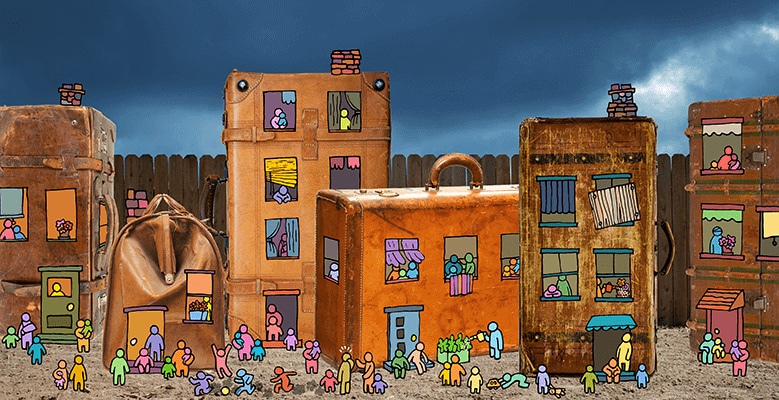
As stay-at-home restrictions begin to ease around the world, most of us are feeling pretty excited to finally get out of the house and breathe some fresh air! These months in quarantine haven’t been easy, but think of it this way: At least we had four walls and a roof to call our own in the first place. There’s nothing like a global pandemic to make you appreciate the safety of home, right?
But imagine if you were just a temporary resident in a new-to-you country. Maybe you were granted a short-term reprieve from the threat of being sent back to your home country (and its war, conflict, or violence), but now you’re applying for permanent residency and are terrified you may not meet the requirements to put down roots there permanently. That’s a reality for many people who have been forced from their homes and are seeking a new life elsewhere—and COVID-19 has made it even tougher
We believe diversity makes our communities better, stronger, and more interesting—and we believe more newcomers should be granted permanent resident status. Here’s why.
Permanent Residents Have a Brighter, Safer Future
When newcomers have assurance that they’ve been accepted as a permanent resident, they’re finally free to make friends, build networks, give back to their neighbourhoods, and start businesses—all of which make our communities better places to live for everyone.
It’s Good for Community-Building and Mental Health
Not knowing how long you’re going to live in one place—or if you’ll be able to support yourself—can really take a toll on your mental health. Many of our newcomers are already fleeing wars and persecution in their home countries; a global pandemic just exacerbates the psychosocial impact on an already vulnerable population. We may not be able to change what’s in the past—but we can provide a brighter future by eliminating some barriers between newcomers and the chance at a fresh start.
Granting Permanent Residence is Good for Business
Coronavirus has taken an economic toll on everyone—no matter who you are or where you live. But for newcomers, who may not speak the language, or who may have restrictions on their ability to work, it’s been devastating. Newcomers have often struggled with job security—which isn’t surprising, as it’s hard to obtain long-term employment if you’re subject to the uncertainties associated with temporary-resident status. During this pandemic, many newcomers have stepped into essential-worker roles; granting them permanent residence keeps the economy ticking and helps our new friends and neighbors earn a living and create a new life.
It’s Time to Revise the Temporary Resident Rule
Here in Sweden, we’ve been operating under a default setting that’s stuck on “temporary” for newcomers to our country. The Swedish Temporary Aliens Act effectively pulled in the welcome mat for people seeking asylum in Sweden beginning in 2016—and it’s had far-reaching (and highly negative) effects, including on newcomers’ mental and physical health, their ability to work, and on their families. Women, in particular, suffer under this policy. Despite that, the Swedish Riskdag extended the policy for another two years just last June. It’s time to call for an end to restrictive policies that turn people away based on income, work status, or a ticking clock—particularly when we’re living through one of the worst global crises we’ve faced in decades.
You Can Make a Difference!
As some governments have been closing doors to newcomers, many civilian groups have been working hard to create initiatives to support newcomers trying to build a new life here. Recognising that community is key, organisations like our partner, Nema Problema, in Sweden have launched mentoring programs to pair newcomers with established Swedes to aid them in finding work, making new friends, and becoming active members of their communities. We encourage you to find a community organisation near you that’s doing similar work. Together, we can make our communities brighter, better, and more diverse. Join us!
Recent Articles


